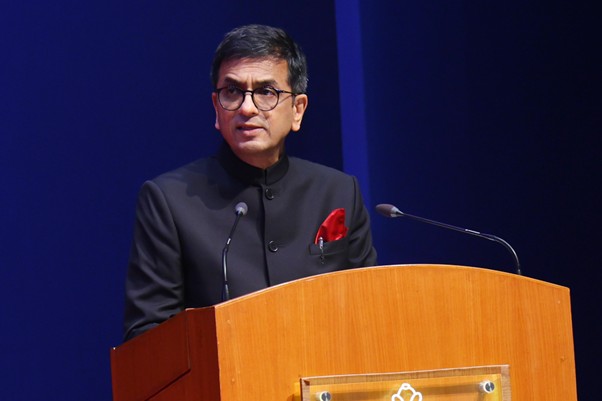Empowering Voices: Chief Justice D.Y Chandrachud Launches Handbook Concerning Persons Disability Rights
(Judicial Quest News Network)
New Delhi 28, September,2024
In a groundbreaking event, Chief Justice of India Dr. D.Y. Chandrachud unveiled a comprehensive handbook on the rights of persons with disabilities during the 9th National Stakeholders Consultation focused on the protection of children living with disabilities. This initiative specifically addresses issues related to children with intellectual and developmental disabilities, emphasizing the importance of intersectionality in understanding their unique challenges.
During the launch, Chief Justice Chandrachud expressed his enthusiasm, stating, “This handbook aims to sensitize not only the legal community but society at large, promoting the use of inclusive language when discussing disabilities.” He emphasized that confronting stereotypes and biases is essential, as they can significantly impact legal proceedings—particularly in evaluating the testimony and credibility of children with disabilities.
To enhance accessibility, the handbook will also be available in Braille and as an audiobook, ensuring it reaches individuals of all abilities. The Chief Justice shared his personal connection to this cause, noting that as a father of two daughters, he is acutely aware of the joys and responsibilities involved in nurturing an inclusive society where every child is valued and protected.
Urgent Issues in Disability Rights
Chief Justice Chandrachud highlighted four critical areas requiring immediate attention from the judiciary and policymakers:
- Data Collection: He underscored the alarming absence of reliable data on children with disabilities, particularly those who are survivors of abuse or in conflict with the law. Without accurate information, crafting effective policies and interventions is nearly impossible. “Data is the foundation of meaningful reforms,” he insisted, urging for prioritized data collection within the juvenile justice framework to better understand the barriers these children face.
- Robust Legal Framework: The Chief Justice noted that while the Rights of Persons with Disabilities Act of 2016 represents a significant advancement, it often remains reactive, focusing more on penalties than on proactive support and prevention. He pointed out that current laws inadequately address the root causes of abuse and neglect faced by children with disabilities, and stressed the need for a shift towards a more supportive approach.
- Training for Justice Professionals: He called for ongoing training and sensitization for judges, police officers, and lawyers to better equip them in understanding the unique vulnerabilities of children with disabilities. Citing examples from the UK, where specialized training has improved justice outcomes, he emphasized that empathy and awareness are crucial for handling such sensitive cases.
- Intersectionality: The Chief Justice addressed the concept of intersectionality, explaining how children with disabilities often face compounded discrimination based on gender, caste, socio-economic status, and ethnicity. He referenced a landmark Supreme Court case that highlighted the heightened vulnerabilities of a disabled girl from a scheduled caste, demonstrating the need for the justice system to respond comprehensively to these layered challenges.
Moving Towards a More Inclusive Justice System
In his concluding remarks, Chief Justice Chandrachud advocated for restorative justice approaches, suggesting that rehabilitation and reintegration measures should be adapted to meet the specific needs of children with disabilities. He stressed the importance of creating an inclusive environment within the juvenile justice system to ensure that all children receive the support they need to thrive.
The consultation itself was structured into four focused sessions, covering topics such as global instruments, national legislation, family-based care, and the convergence of health and educational policies. Organized by the Juvenile Justice Committee of the Supreme Court, under the leadership of Justice B.V. Nagarathna and in collaboration with UNICEF India, the event highlighted the urgent need for a coordinated effort to protect the rights of children with disabilities.
With this initiative, the judiciary aims not only to raise awareness but also to implement effective strategies that will create a more just and inclusive society for all children, regardless of their abilities.




